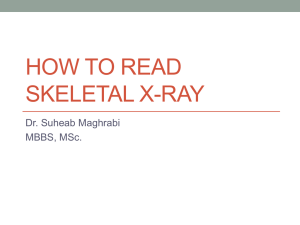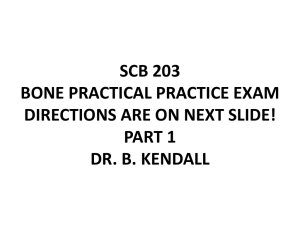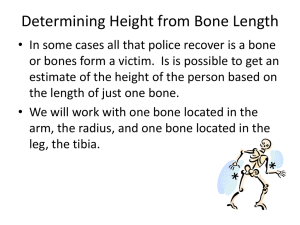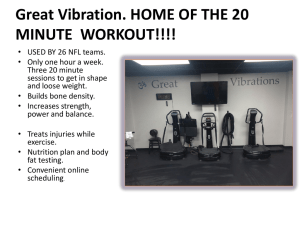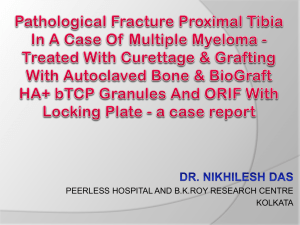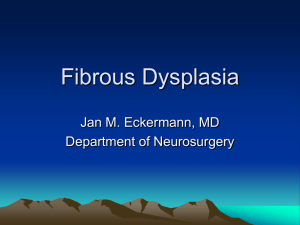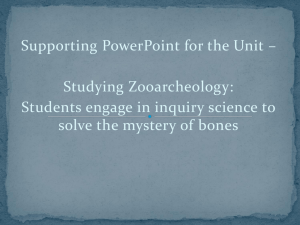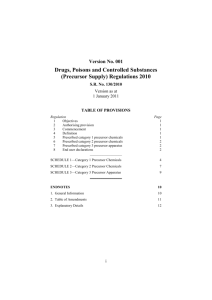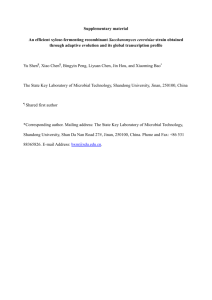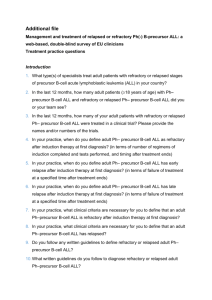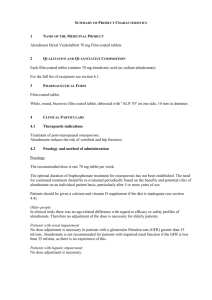OSTEOGROW
advertisement
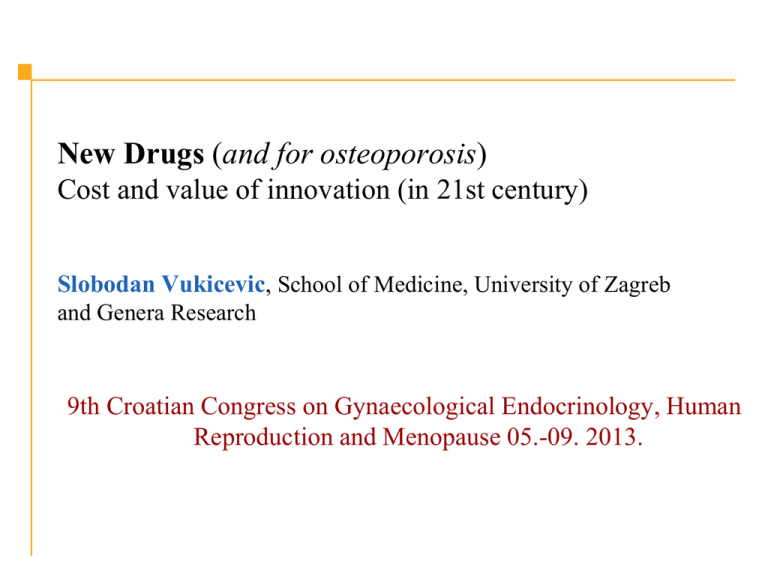
New Drugs (and for osteoporosis) Cost and value of innovation (in 21st century) Slobodan Vukicevic, School of Medicine, University of Zagreb and Genera Research 9th Croatian Congress on Gynaecological Endocrinology, Human Reproduction and Menopause 05.-09. 2013. Lifespan age 46 26 Clean water 76 66 Vaccination Prices for large-cap pharmaceutical stocks had been weighed down for years as companies braced themselves to lose their lucrative patents for blockbuster drugs. New drugs Crisis 86 ????? 2012: Scientific American 14 top science questions S&T half of US economy growth since WWII doubling funding >3% GDP Enforce vaccination in interest of public health Innovation and exonomy Climate change Research and the future Pandemics and biosecurity Education Energy Food Fresh water Ocean health Space Critical natural resources Vaccination and public health Academia The future of SCIENCE: Regenerative medicine Regenerative species ONLY BONE CAN FULY REGENERATE Adult amphibians, fish and neonatal mice regenerate heart Ezekiel 36:26 – I will remove from you your heart of stone and give you a heart of flesh Neonatal mice: Scarless healing – The heart of flesh Blood clot Scar Regeneration Porrello et al Science 2011 7 day old mice: No regeneration after apical heart resection Day 1 Day 7 Day 21 Scar formation – The heart of stone Porrello et al Science 2011 Scarless limb regeneration in adult amphibians and fish Axolotl hindlimb regeneration Rao et al BMC Biol 2009 Epimorphic regeneration through creation of a primitive blastema Day 1 Day 4 Wound epidermis histolysis dedifferentiation toward WE accumulation of blastema cells Day 7 migration Proteomic analyses of blastema: Diagram of regeneration processes Amputation Ecotropic viral integrative factor Prevents mitosis prior to formation of blastema Amputation histolysis liberation of cells from ECM Rao et al BMC Biol 2009; Guimond et al BMC Biol 2010 BMP-1-1 + BMP-1-3 + BMP-7 + BMP-2 m e pz bm Human development 8 weeks gestation The future of Pharmaceutical SCIENCE • Innovation crisis of pharmaceutical industry is occuring in new golden age of scientific discovery • No help from customer knowledge, disease expertise and decades of experience in predicting success US, EU Croatia Science, medicine, sport Sport 1950-2012 • FDA approved 1,296 new drugs: 1,167 are small molecules and 145 are biologicals • $50 billion per year • below level required to secure the future of pharmaceutical industry • constant rate: not influenced by technology, mergers, acquisitions, etc. • longevity increased in 60 years for 10 years by an average of 2 months each year MERCK most productive with 56 approvals, LILLY 51, ROCHE 50 2010 • Pharmaceutical industry spent more than $60 billion on R&D • FDA approved only 21 new drugs • Probability that a company’s NME output will exceed 2 or 3 per year is 0.06% and 0.003% = NME output cannot reach threshold of sustainability Clinical trial Clinical trail should be resource-effective and patient-centered Design Difficult: Design chronic disease trials that require fewer visits for people enrolled Insulin Antibiotics Estrogen-like Marjorie Salvarsan SERM: Lasofoxifene pancreas extract 1 patient diabetic coma few hours Cost 1 patient cured of phemphigus few days 8570 patients prevent bone fracture (n=43) breast cancer (n=27) 5 years COST The price of failure • Amgen, CA - $3.7 billion per approved drug (total R&D divided by number of approved agents) • AstraZeneca, UK - $12 billion per drug due to recent late-stage clinical trial failures of drugs for diabetes, depression and ovarian cancer Solutions? • Standard practice creates little value in industry dominated by blockbuster, like sail forecasts which miss 80% of time • Open innovation • Global brain for best science and ideas wherever they may be • European Innovative Medicines Initiative (http://www.imi.europa.eu/) • Innocentive, chorus, public-private partnership, open-source R&D, X Prize, innovation networks, FIPNet, consortia and various combinations of these and other initiatives • Eli Lilly announced Open Innovation Drug Discovery (https://openinnovation.lilly.com/dd/index.html), available essays and expertise to academic institutions • Pfizer allow others to screen against their internal compound library • GSK created a pool of 800 patents for research of neglected diseases • Across industry most patents remain uncommercialized (90%) • Co-creation involves sharing costs and benefits of innovation The cause of crisis in pharmaceutical industry research? • Evaluation of Universities: – 8-15% of extraordinary scientists at Harvard, MIT, Berckley, Yale, Hopkins, Oxford, Cambridge – 5-7% at Leuven, Leiden, Lund, Tokyo – 1-2% at Vienna, Rome, London, Moscow, Shanghai – 0.1-0.2% at Zagreb, Ljubljana, Triest In the end, innovation comes from one person Alendronate: 20 years after MSD: Gideon Rodan in the field of bone cell biology Led alendronate from the discovery to FDA approval Clinical scientist with highest moral integrity. Clinical trials of alendronate were highly successful without post-hoc adjustments Discovered new class of drugs His outstanding scientific contributions included: isolation and characterization of the first transformed osteoblastic cell line (ROS 17), the dissection of the PTH signal transduction mechanisms, the concept of osteoblast-osteoclast interactions, the cloning of alkaline phosphatase, and the roles of steroids and prostaglandins in bone metabolism. As Director of the Department of Bone Biology and Osteoporosis Research at Merck, he fostered the development of the first bisphosphonate approved for treatment of osteoporosis and provided detailed studies of the mechanisms of action of the bisphosphonates. Amgen: David Lacey unravelled the osteoblast osteoclast communication mechanism • Prolia® (denosumab) • XGEVA® From: History of medical discoveries 200 years of NEJM the most serendipitous discovery in the history of science (fortunate discovery by accident) In 1928, Sir Alexander Fleming: From NEJM „While investigating variants of Staphylococcus, Fleming set a number of culture plates aside on a lab bench for future observation. Several days later, he noticed that the cultures had been contaminated by mold spores (Penicillium notatum) and, amazingly, that the Staphylococcus colonies were receding in areas where the mold was growing”. more than a decade elapsed before it was put into serious clinical use. Adequate supplies were not available, and the applicability of penicillin to various bacterial infections was not yet appreciated. In the 1940s, as Germany began its invasion of Europe, a team of scientists at Oxford started the work that would ultimately allow the mass production of penicillin and realize the amazing therapeutic potential of Fleming’s discovery. Jonas Salk The most famous clinical trial ever Apart from the atomic bomb, America's greatest fear was polio frantic race to find a way to prevent or cure the disease U.S. president Franklin D. Roosevelt was the world's most recognized victim Salk took seven years "the most elaborate program of its kind in history, involving 20,000 physicians and public health officers, 64,000 school personnel, and 220,000 volunteers." Over 1,800,000 school children took part in the trial When news of the vaccine's success was made public on April 12, 1955, Salk was hailed as a "miracle worker," and the day "almost became a national holiday." harsh criticism from the scientific and medical communities In 1979, polio was declared eradicated from the United States No interest in personal profit Who owned the patent to the vaccine? Salk replied: "There is no patent. Could you patent the sun?" Back to bones Novel targets for intervention in postmenopausal osteoporosis Innovation in research Cathepsin K Odanacatib Phase III Weekly oral dosing Sclerostin AMG 785 Phase II Dose ranging Dickkopf BHQ 880 Phase IIb Multiple myeloma Serotonin LP533401 Preclinical Bone formation Nitric oxide Nitroglycerin Increased BMD Topical ointment Calcium sensing receptor MK5442 Phase II/III Daily oral dosing Phase I Bone repair device BMP6 OSTEOGROW Alendronate: Threats path bone loss after osteonecrosis of bone therapy jaw biomechanics disconntinuation 1993/2003 1998/2003 FIT 3236 FLEX 2852 2005 atrial oesophagus fibrilation cancer 2006 16,000.000 treated with alendronate side effects present in 0.24% 2007 atypical fractures 2008 Osugi et al. Acta Orthop 82:112, 2011 Treatment of diaphysal and metaphyseal osteoporotic fractures Discovery of OSTEOGROW Osteogenic molecules in human plasma IPI00003351 Extracellular matrix protein 1 precursor 1 65 11 IPI00029193 Hepatocite growth factor activator precursor 1 51 11 IPI00018305 Insulin like growth factor binding protein 3 precursor 1 46 11 IPI00291136 Collagen alpha 1 (VI) chain precursor 1 33 11 IPI00297284 Insulin like growth factor binding protein 2 precursor 1 27 11 IPI00024825 Megakaryocyte stimulating factor/lubricin/proteoglycan 4 8 366 12 IPI00029193 Hepatocite growth factor activator precursor 6 350 12 IPI00007634 PINCH protein /renal carcinoma antigen NY-REN-48 (effector of integrin and growth factor signaling 2 112 12 IPI00022822 Splice isoform 1 of collagen alpha 1 (XVIII) chain precursor 2 123 12 IPI00018305 Insulin like growth factor binding protein 3 precursor 2 61 12 IPI00299738 Procollagen C-proteinase enhancer protein precursor 2 82 12 IPI00016915 Insulin like growth factor binding protein 7 precursor 2 56 12 IPI00020977 Splice isoform 1 of connective tissue growth factor precursor (Hypertrophic chondrocyte specific protein 24)CTGF-major connective tissue mitoattractant secreted by vascular endothelial cells. Promotes proliferation and differentiation of chondrocytes 2 73 12 IPI00024887 Bone morphogenetic protein 6 3 41 12 IPI00029236 Insulin like growth factor binding protein 5 precursor 1 32 12 IPI00022822 Splice isoform 1 of collagen alpha 1 (XVIII) chain precursor 4 244 13 K60 is associated with BMP-6 resistantce to noggin Engineering BMPs with super-agonist activity Song et al JBC 2010 Carrier for BMP-6 * * * * * * * BMP-6 PLASMA SERUM in vivo in vitro Autologous carrier for BMPs to replace bovine collagen in commercial BMP bone devices Several modification to prepare coagulum maleable, injectable and flexible Vukicevic, Grgurevic and Oppermann: Whole blood-derived coagulum device for treating bone defects, US 8197840, June 12 2012. OSTEOGROW formulation Full blood serum clot binds to clot components Injected between bone ends OSTEOGROW: Low dose BMP6 8 weeks Control Commercial device Osteogrow

